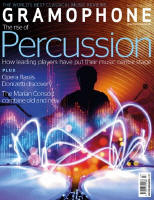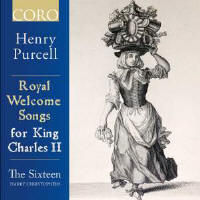Texte paru dans: / Appeared in: |
|
|
Outil de traduction (Très approximatif) |
|
|
Reviewer: David Vickers The Sixteen cleverly mix up secular, political and sacred pieces revolving around flattering court odes that welcomed the king and his retinue back to Whitehall after trips around the country. Elegantly appointed strings and sweet phrasing are spot-on for Welcome, Vicegerent of the mighty King (c1680); its lovely soprano duet ‘When the summer in his glory’ (sung blithely by Kirsty Hopkins and Grace Davidson) and charming trio ‘Music, the food of love’ (led suavely by Nicholas Mulroy) would not be out of place in any of Purcell’s operas. Indeed, Andrew Pinnock’s note observes that elements of the delectable interfusion of solos, vocal ensembles and exquisite string ritornellos in Fly, bold rebellion (1683) are comparable to bits of Dido and Aeneas (which probably originated for the court about a year later). The moralising songs Sleep, Adam, sleep, and take thy rest (published 1683) and Great God, and just (published 1688) are sung sweetly and with excellent diction by Hopkins. Five-part solo voices adroitly exploit each dissonance and textual detail of the lamentation Let mine eyes run down with tears (a verse anthem for Westminster Abbey, 1682). Likewise, eloquent solo contributions within a judicious quartet of voices are impeccably nuanced in the Latin psalm Beati omnes qui timent Dominum (c1680). A polite account of the catch Since the Duke is return’d is not quite rough enough around the edges for satirical tavern music at the bawdier end of Purcell’s activities but the Chapel Royal anthem O sing unto the Lord (1688) benefits from the streamlined transparency and relaxed rhythmical precision of an eight-voice ensemble and string band of 12; Ben Davies’s articulate bass solos and the small choir’s astute harmonic shading of ‘Let the whole earth stand in awe of him’ are delightful, and the soft gracefulness of the closing ‘Alleluia’ is a refreshing change from robust larger-scale interpretations. Harry Christophers’s sense of shapely natural pacing is unerring, although the frequent inclusion of anachronistic harp is a baffling whimsy. |
|




